Sacked Matildas coach Alen Stajcic questions the reasons behind his axing
In a frank media conference, sacked Matildas boss Alen Stajcic admits fears his coaching reputation has been ruined by the furore over his axing, a year after turning down lucrative approaches to quit the Matildas.
Sacked Matildas boss Alen Stajcic admits he fears his international coaching reputation has been ruined by the furore over his axing, a year after he turned down two lucrative approaches to quit the Matildas.
After Stajcic broke his silence in an emotional press conference in a bid to clear his name, The Daily Telegraph can reveal that Stajcic was headhunted in late 2017 by both the English and Chinese football associations to coach their women’s teams.
Though Stajcic insisted he had no regrets over turning down the overtures, he said the need to avoid his reputation being terminally damaged had led him to front a packed media conference on Monday.
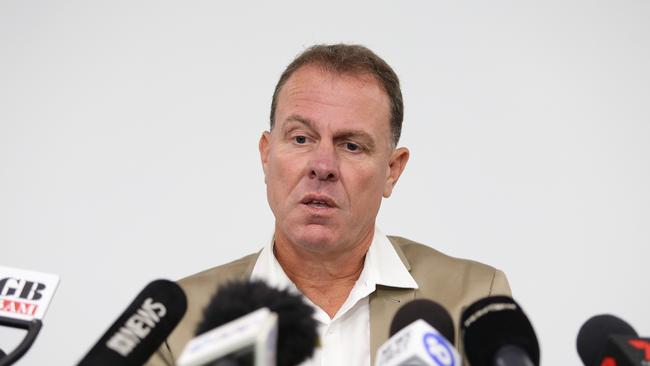
Speaking hours before the Football Federation Australia board met to address the toxic fallout from his sacking, Stajcic almost broke down several times at the press conference while detailing the effect of his sacking on his wife and daughters.
“I’m here to clear my name,” he said at the outset and later told The Daily Telegraph that he had to counter the “innuendo” that had “exploded” since FFA terminated his contract without warning three weeks ago.
The two approaches from England and China prompted Football Federation Australia to renegotiate Stajcic’s contract and award him a significant pay rise in December 2017 — with Stajcic admitting he was worried such opportunities might not come again.

“That’s a possibility and one of the main reasons that I wanted to do the press conference,” he said. “To try to quell the innuendo that has exploded around the world and in Australia and begin the process of restoring my reputation.”
“It’s very easy to regret (not taking the offers) now in hindsight — they were difficult decisions at the time, but ultimately my heart and passion has always been with Australian football, and with Australian football succeeding.
“That’s always been the driving force behind my decisions, so I can’t regret them now.”
Stajcic insisted that he had received regular congratulatory missives from FFA CEO David Gallop during his more than four years in charge, and that he assumed he had the backing senior management.
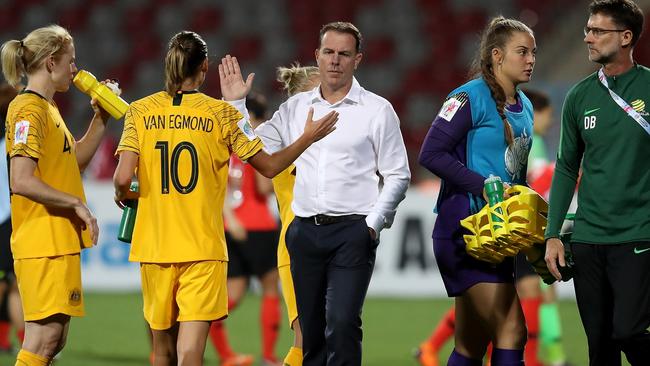
“Considering that they went through an exhaustive process to appoint me in the first place, and we went through quite a few contract renewals and upgrades, I’d take that as evidence that senior management backed me,” he said.
Earlier Stajcic had faced live TV cameras to declare he was “here today to clear my name and restore my reputation”, after three weeks of conjecture about his removal.
“I believe it’s been damaged unjustifiably. I’m here to repair what I can of my reputation after having spent 20 years coaching the game.”
Stajcic held open the threat of legal action for defamation and breach of contract, and reiterated he and his family still don’t have a clue why his employment with FFA was terminated abruptly one day after a single 20-minute meeting with chief executive David Gallop.
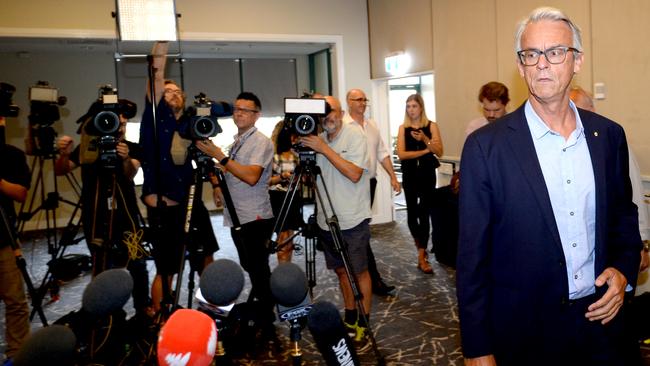
“It’s extremely hard as you can imagine,” he said.
“Both my kids have had to go to school, read the speculation and innuendo, the firestorm that’s erupted due to the lack of clarity and transparency that was offered, due to the nature of the comments both public and private that were offered by the board directors, more than one.
“That’s just added to the speculation that’s been around over the last couple of weeks.
“As a father and person who’s highly engaged in my community that’s certainly been the toughest part to take.”
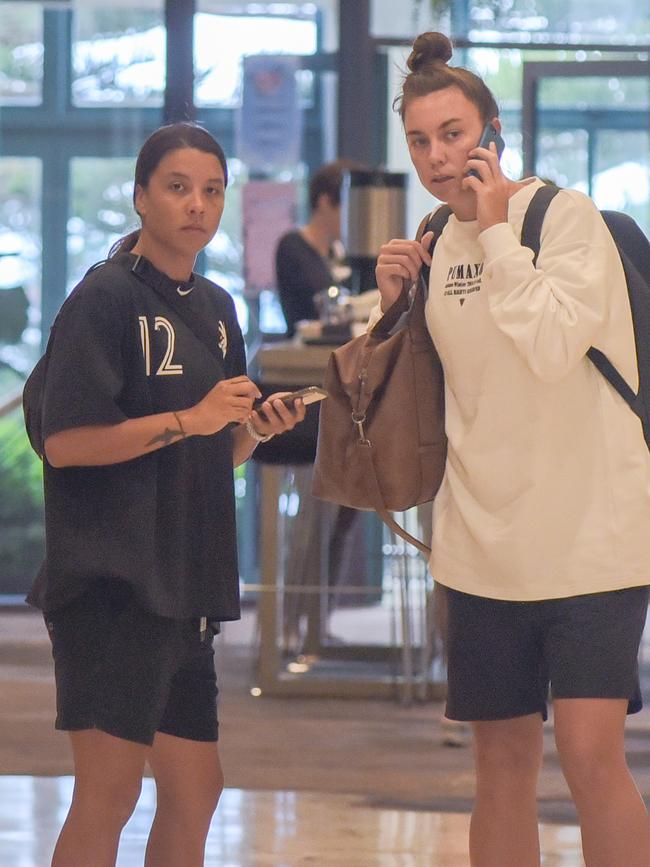
In a statement released on Monday afternoon, FFA said they were “surprised” by Stajcic’s comments but gave no further detail on the process behind the decision to swing the axe.
“We disagree with many of [Stajcic’s] assertions and were surprised by a number of his comments, FFA chairman Chris Nikou said.
“Indeed Mr Stajcic, by his own admission and in the presence of an FFA lawyer and the FFA CEO David Gallop, said that the team environment was ‘dysfunctional’ and was ‘always going to be this way’. In those circumstances we decided to act in time to put the team’s FIFA Women’s World Cup campaign back on track. It’s the board’s duty to make these decisions.
“Nothing Mr Stajcic said changes the facts, that built up over time, that informed the FFA’s decision to legally terminate his employment as coach of the Matildas. The FFA reached a unanimous view that Mr Stajcic was no longer the right person to enable the Matildas to perform at their best - on and off the pitch.”
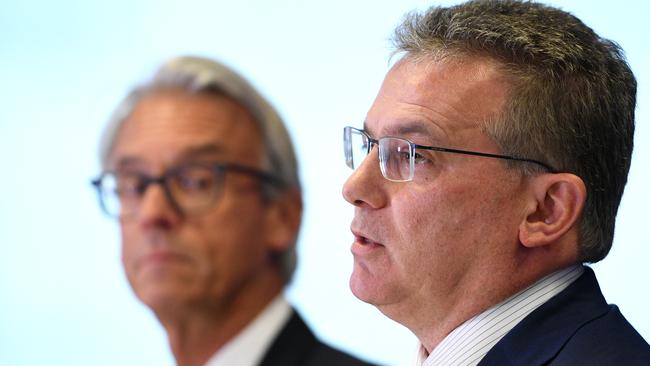
FFA has repeatedly cited confidentiality requirements as the reason for its continued silence on details regarding the survey from gender equality group Our Watch, a central factor in the whole storm which Stajcic says he has requested but not been shown.
FFA CEO David Gallop said that secrecy was not about to change, regardless of the outcry.
“A change was needed. We are also mindful that the people who participated in the review processes, including the surveys and other information gathered, did so on a confidential basis. We will not breach those commitments to players and staff.”
Stajcic added he’d seen the results from the other survey, a Professional Footballers Australia wellbeing audit, back in December but warned national teams head Luke Casserly at that time it “was materially and hopelessly flawed in its design and delivery”.
Stajcic described the team culture as “evolving over a long period of time” but warned that the new coach would face exactly the same issues in setting the team culture.
“It’s been a really steep learning curve for the group over the last two years as they’ve transitioned from being semi-professional to professional footballers,” he said.
“Football is now their income, their life. It is the notion of how many competitions they have to play in, whether it’s domestic or overseas.
“That’s brought its own challenges for the players in terms of their welfare and their wellness away for the field and on the field, and having to transit all over the world to play their football to ensure they have enough substance to be able to have a normal life.
“It’s been a really challenging learning curve for the bulk of the group. We probably had two or three players in that boat in the previous few years but now we have the bulk of the team.
“And when you add in the amount of attention and scrutiny the team now has in Australia and the popularity. We’re dealing with those challenges on a daily basis and that’s something that will continue to evolve whether I’m the coach or someone else is the coach.”
Get every match of the 2018/19 Hyundai A-League LIVE. SIGN UP NOW!


